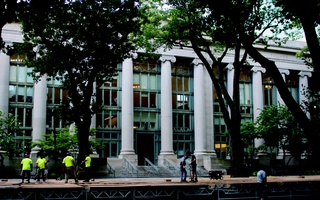{shortcode-1e705751e911b8ce8992d743ebb12b6862721944}
Weeks after student organizers at Columbia University announced a tuition strike to protest their administration’s “flagrant disregard” for proposed university-wide demands, Harvard student activists have not indicated if they will organize a tuition strike of their own.
In a November letter, strike organizers at Columbia called on their administration to lower tuition costs, increase financial aid, dismantle the campus private police force, and halt the University’s expansion into West Harlem.
If these concerns were not addressed, more than 2,000 Columbia students were prepared to withhold tuition payments and donations to the university, per the letter. As of Feb. 11, more than 4,400 students have signed a petition in support of the strike.
While Harvard’s unions and activist groups have publicly supported the Columbia organizers, they have not indicated if they plan to launch a similar effort.
Brandon J. Mancilla, the president of the Harvard Graduate Students Union - United Automobile Workers, wrote in an email that the union is not planning for a tuition strike, citing that such action would fall under the domain of undergraduate organizers.
“Our union, HGSU, negotiates the wages, rights, benefits, and protections of student workers, not the tuition that undergraduates and other graduate students (specifically masters students and professional school students) pay,” Mancilla wrote. “Thus, it is not our place or purpose to initiate such an action.”
Mancilla added that, if tuition-paying students decide to strike, HGSU-UAW would support their initiative.
“This Columbia action was taken by undergraduates. If such a thing were to happen at Harvard it would be led and organized by Harvard undergraduates,” he wrote.
Ruy A. Martinez ’22, co-chair of the Harvard College Young Democratic Socialists of America, wrote in an email that the chapter’s members were “inspired” and “amazed” by the organizing efforts of the Columbia YDSA chapter.
“The only way to unite the student body in such a forward action is through solidarity as part of a multi-racial working class coalition that fights for justice at all levels in this school,” Martinez wrote. “Regardless of our goals relating to the University and tuition, this is our chief organizing principle, and is the most important takeaway from the powerful and inspiring tuition strike at Columbia.”
Martinez did not say if his organization was planning to announce a tuition strike of its own.
Matthew A. Gamero, a sophomore at Columbia and a strike organizer, said withholding tuition provides students with the opportunity to use financial leverage against the University.
“What brought me into the strike was recognizing all the power that students have,” Gamero said. “We can collectivize and organize to create a movement to hold leverage against those who we thought we couldn't ever influence or even change their position.”
Gamero added the organizers paired up with coalitions, such as the Mobilized African Diaspora, to protest the gentrification in West Harlem that stems from the University’s campus expansion plans.
“We understood that this strike can be a way to get Columbia to listen to their demands,” he said.
Willem Morris, a senior at Columbia and strike organizer, said he hopes the strike will be included in the “larger conversation” about the affordability of higher education.
“We really hope that this movement can be a part of a larger conversation about affordable education,” Morris said. “It’s really important to us that this conversation extends beyond the pandemic, because this problem isn't going away, even if the pandemic does.”
A Columbia University spokesperson wrote in an email to The Crimson that its leadership is attuned to student demands and understands the motivations behind the strike.
"This is a moment when an active reappraisal of the status quo is understandable, and we expect nothing less from our students,” the statement read. “Their voices are heard by Columbia's leadership, and their views on strengthening the University are welcomed."
Jeremy Dominguez, a student at Harvard Extension School, said the challenges students face during the pandemic warrant more recognition from the University in the form of lowering tuition rates.
“I definitely think Harvard has not done much at all to what they should be doing, what they're supposed to be doing,” Dominguez said. “A tuition strike is definitely overdue, long past overdue at Harvard at this point.”
Peer institutions like Princeton University, American University, and Georgetown University announced 10 percent tuition cuts for the 2020-2021 academic year, while Williams College cut its cost of attendance by 15 percent.
Harvard spokesperson Jason A. Newton declined to comment on whether or not Harvard would freeze or reduce tuition fees for the next academic year.
Since the pandemic began, Harvard’s administration has increased its support for financial aid programs. University President Lawrence S. Bacow wrote in the University’s Annual Financial Report published in October 2020 that the University increased funding for financial aid by $31 million in the past year.
In the same report, University Chief Financial Officer Thomas J. Hollister and Treasurer Paul J. Finnegan ’75 wrote that Harvard’s financial position “remains strong” as a result of thorough financial planning, despite losing $10 million from operations due to the Covid-19 pandemic.
“This sound financial management allowed the University to be in a position to cover sudden losses from operations, while also investing in the mission, for example, by granting $645 million in financial aid and scholarships to students,” the report read.
Without financial aid, tuition at the College stands at $49,653 for the 2020-2021 academic year and balloons to $72,391 with the addition of room, board, and fees.
—Staff writer Virginia L. Ma can be reached at virginia.ma@thecrimson.com
—Staff writer Kevin A. Simauchi can be reached at kevin.simauchi@thecrimson.com. Follow him on Twitter @Simauchi.
Read more in News
Women Harassed by Domínguez Say Harvard’s Investigatory Procedures Remain InsufficientRecommended Articles
-
 Graduate Students Advocate for Tuition Reimbursements, Extended Health Insurance Coverage Due to Remote Learning Transition
Graduate Students Advocate for Tuition Reimbursements, Extended Health Insurance Coverage Due to Remote Learning Transition -
 Harvard Law Student Files Class Action Lawsuit Demanding Tuition Reimbursement
Harvard Law Student Files Class Action Lawsuit Demanding Tuition Reimbursement -
 Plaintiffs’ Law Association Hosts Forum on Tuition Reimbursement Class Action Lawsuit Against Harvard
Plaintiffs’ Law Association Hosts Forum on Tuition Reimbursement Class Action Lawsuit Against Harvard -
 Grad Student Union Alleges Harvard Attempting to ‘Defund’ the Union by ‘Starving Out’ Resources
Grad Student Union Alleges Harvard Attempting to ‘Defund’ the Union by ‘Starving Out’ Resources -
 Job Insecurity, Union Negotiations Loom Large Amid Pandemic
Job Insecurity, Union Negotiations Loom Large Amid Pandemic













